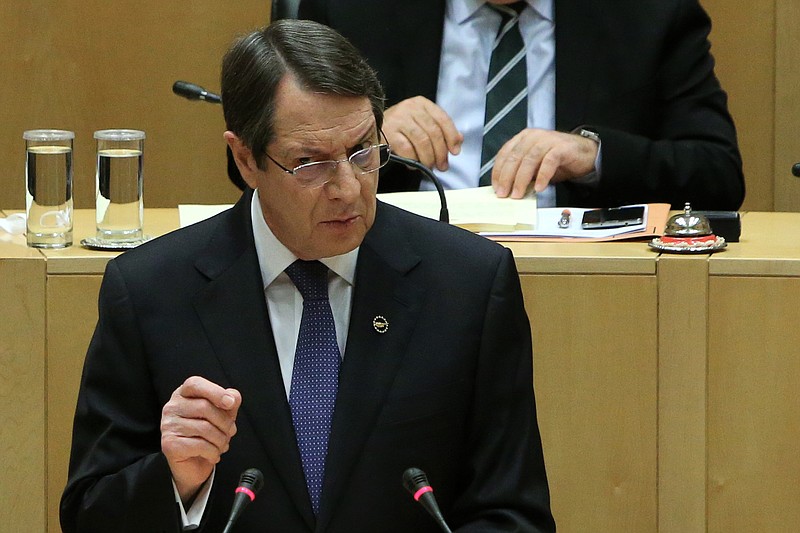NICOSIA, Cyprus (AP) - Peace talks aimed at reunifying ethnically split Cyprus have made significant progress on how power will be shared with breakaway Turkish Cypriots and how the economy will function under a federation, the country's president said Thursday.
Briefing lawmakers at a special parliamentary session, Nicos Anastasiades said he and Turkish Cypriot leader Mustafa Akinci have also agreed after nine months of negotiations on the legal ways to deal with property lost during Turkey's 1974 invasion that followed a coup aiming at union with Greece.
He said a population ratio of four Greek Cypriots to one Turkish Cypriot will remain constant and will be reflected in the makeup of the lower house of Parliament. A 40-member upper chamber, or senate, will be composed of an equal number of Greek and Turkish Cypriots.
Anastasiades said a property committee will decide whether owners can either fully or partially reclaim their property, be given property elsewhere, exchange the property, receive monetary compensation or a combination of those events. Courts will adjudicate cases were owners aren't satisfied.
Citizens will have the right to work, live and own property in either constituent state, Anastasiades said, while courts will have an equal number of Greek and Turkish Cypriot judges.
The euro will be the country's official currency from day one of reunification and the country will have one central bank.
The Cypriot president said differences remain - including a Turkish Cypriot insistence on a rotating presidency. Another key issue that's unclear is how much territory will fall under Greek or Turkish jurisdiction.
Greek Cypriots also staunchly reject military intervention rights accorded to Turkey under Cyprus' existing constitution. Anastasiades said no European Union member state can be subject to any such rights ceded to another country.
The Cypriot president also signaled to Turkey that without its support for a deal, it won't fulfill its ambitions to become a regional energy hub and join the European Union, which Cyprus joined in 2004. A deal would also improve EU-NATO relations, he added.
Anastasiades said more time was needed to produce an accord "that won't be subject to misinterpretation." A clear-cut deal is seen as essential to gain support from both Greek and Turkish Cypriots who, if an agreement is reached, will vote on it in separate referendums.
"The aimed-for solution must be a product of an honorable compromise that will create conditions of mutual respect and won't permit the imposition of the minority over the majority and naturally vice versa," said Anastasiades.
Anastasiades spent a sizeable portion of his speech rebuffing critics who either oppose or have expressed serious misgivings with the federal model under negotiation, which they fear could legitimate the island's ethnic divisions and strip Greek Cypriots of rights.
Turkish Cypriots declared an independent state in the island's northern third in 1983. The state is recognized only by Turkey, which maintains more than 40,000 troops there.
